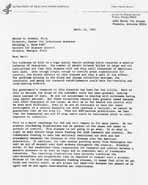On a day in 1983 when former Secretary of Health and Human Services Margaret Heckler told Congress that no further funding for AIDS was necessary, Dr. Don Francis, an epidemiologist at the Centers for Disease Control (CDC) sent this memo to his bosses. "Our government's response to this disaster has been far too little," he wrote. "… The inadequate funding to date has seriously restricted our work and has presumably deepened the invasion of this disease into the American population."
Public Health Services
Centers for Disease Control
Atlanta, Georgia 30333
4402 North 7th Street
Phoenix, Arizona 85014
April 12, 1983
Walter R. Dowdle, Ph.D.
Director, Center for Infectious Diseases
Building 1, Room 6007
Centers for Disease Control
Atlanta, Georgia 30333
Dear Walt:
The outbreak of AIDS is a huge public health problem which requires a massive infusion of resources. The number of people already killed is large and all indications are that this disease will not stop until thousands of Americans have died. Even though tragic enough to justify great expenditures for control, the direct effects of this disease are only a part of its effect. The problem arising in the blood and plasma collection systems, the hospitals, and among the research establishments could have far-reaching and long-lasting effects.
Our government's response to this disaster has been far too little. Much of this is because the slope of the epidemic curve has been gradual, lasting years instead of days. We are not accustomed to dealing with outbreaks having long latent periods. But these situations require even greater speed because even after discovery of the cause, we will be so far behind and control will be even more difficult. Even if we are so fortunate to have the rapid development of a control modality for AIDS (perhaps a vaccine), we cannot be guaranteed that we can stop it. from our HBV-vaccine predictions, we fear that few homosexual men and IV drug users could be vaccinated prior to their exposure to infection.
This is a major challenge for CDC and will remain so for many years. We can predict increasing frustrations now in pursuit of the cause and later in pursuit of control. This disease is not going to go away. To do what is right we must ensure large scale funding for AIDS research and control. The inadequate funding to date has seriously restricted our work and has presumably deepened the invasion of this disease into the American population. In addition, the time wasted pursuing money from Washington has cast an air of despair over AIDS workers throughout the country. Possibly worse, it has sandwiched those responsible for research and control between massive pressure to do what is right and an ummovable wall of inadequate resources. The resulting frustrations have severely inhibited the open-mindedness and cooperation that is required to conquer such a scourge. Because of the slow and inadequate funding process, it seems that after we get funds and recruit staff, we are always too late -- the disease has passed us up again and we are again understaffed and underfunded.
There must be a way to do it right. We can predict a massive need of both epidemiologic and laboratory staff and a need for rapidly mobilizable funds to undertake field investigations. In this vast and wealth country there must be a way to get $10 to $20 million immediately for this disease. I stress speed because the usual government funding and spending processes are so slow to be unacceptable in such an emergency situation.
For the good of the people of this country and the world, we should no longer accept the claims of inadequate funding and we should no longer be content with the trivial resources offered. Our past and present efforts have been and are far too small and we can't be proud. It is time to do more. It is time to do what is right.
With utmost concern and continuing hope
[signed]
Donald P. Francis, M.D., D.Sc.
Assistant Director for Medical Science
